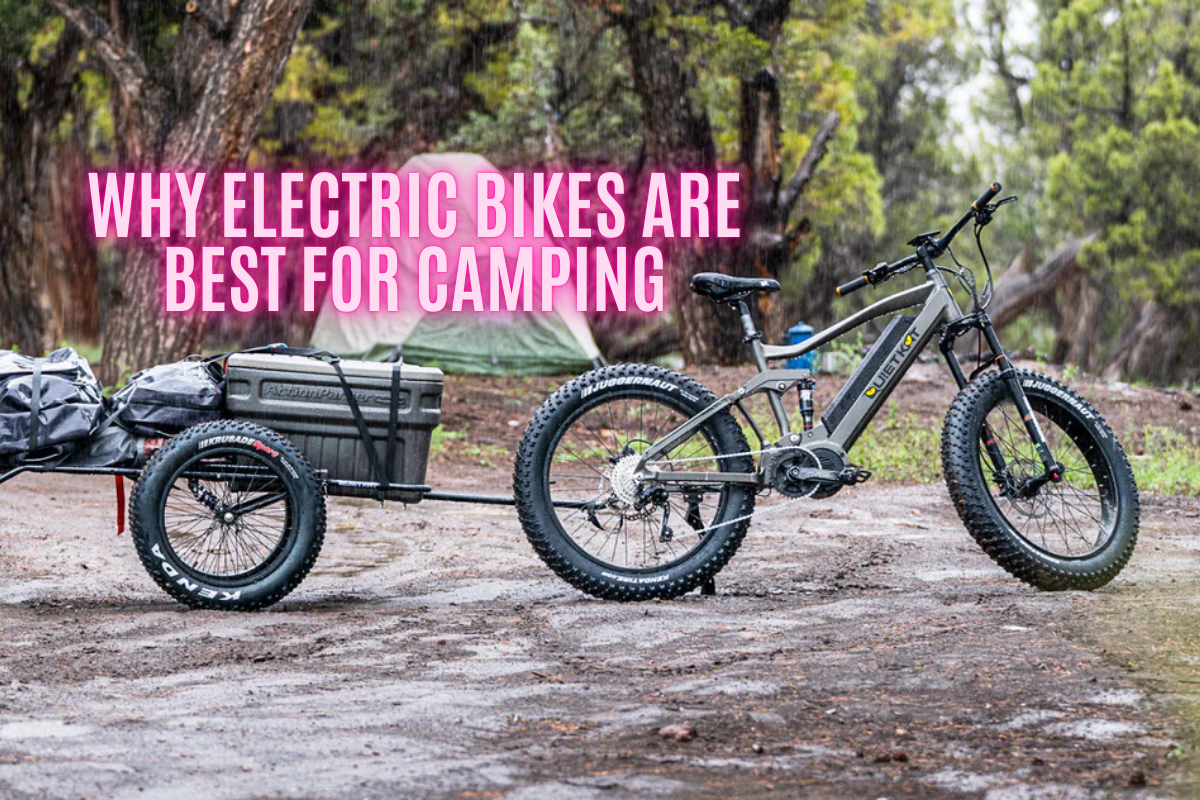Welcome to our comprehensive guide on why electric bikes are becoming the go-to choice for camping enthusiasts. As outdoor adventures continue to evolve, so does the equipment we use to enhance our experiences. Electric bikes, or e-bikes, have emerged as a game-changing tool for campers, offering a perfect blend of convenience, eco-friendliness, and versatility. In this article, we’ll explore the numerous benefits of using electric bikes for camping, from their environmental advantages to their practical applications in various camping scenarios. Whether you’re a seasoned camper looking to upgrade your gear or a newcomer curious about the latest trends in outdoor recreation, join us as we delve into the world of electric bikes and discover why they’re revolutionizing the camping experience.
Benefits of Electric Bikes for Camping
Electric bikes offer several advantages for camping enthusiasts. They enhance the outdoor experience through eco-friendliness, ease of maneuvering across challenging landscapes, and longer travel distances, allowing for greater exploration.
Zero Emissions and Environmental Conservation
Electric bikes produce zero emissions, making them an excellent choice for environmentally conscious campers. Unlike gas-powered vehicles, they do not contribute to air pollution or greenhouse gas emissions.
Using an electric bike helps in reducing one’s carbon footprint while enjoying nature. This choice aligns with the philosophy of camping, which often emphasizes connection with the environment.
Moreover, electric bikes require less energy compared to traditional vehicles. This efficiency aids in preserving natural habitats and wildlife, allowing campers to enjoy their trips with minimal impact on the surroundings.
Ease of Travel Over Varied Terrain
Camping often involves traversing diverse and rugged landscapes. Electric bikes come equipped with pedal-assist features, making it easier for riders to tackle hills and uneven paths.
These bikes are designed for comfort and stability, providing a smooth ride on gravel roads, dirt trails, and steep inclines. Campers can transport gear and personal items effortlessly without the strain associated with manual biking.
The combination of lightweight design and powerful motors enhances maneuverability, allowing riders to explore remote areas with less effort. This accessibility makes electric bikes a practical option for reaching campsites that are off the beaten path.

Extended Range for Exploring More Campsites
One of the standout benefits of electric bikes is their extended range. With advancements in battery technology, many electric bikes can travel significant distances on a single charge.
Campers can venture further into nature without the worry of running out of power. This increased range opens up the opportunity to discover more campsites, scenic views, and hidden trails.
Additionally, riders can easily recharge their bikes at campsites with electrical hook-ups or solar chargers. This flexibility allows for longer trips while ensuring riders have enough battery life to return safely.
Efficiency and Energy Management
Electric bikes offer significant advantages when it comes to efficiency and energy management during camping trips. Understanding battery life and solar charging can enhance the overall experience.
Battery Life and Power Storage
Battery life is crucial for electric bikes, especially during extended camping trips. Most e-bikes use lithium-ion batteries, which provide a balance of weight and capacity. These batteries typically offer a range of 20 to 50 miles on a single charge, depending on terrain and rider input.
Proper power storage is also essential. Ensuring batteries are charged before heading out can prevent surprises. Many models come with features like regenerative braking, which can help recharge the battery while riding downhill. Regular maintenance, including checking battery connections, can extend longevity.
Solar Charging Capabilities
Solar charging is a game-changer for campers with electric bikes. Portable solar panels can harness sunlight to recharge e-bike batteries, making it easier to stay powered up while exploring remote areas.

Key tips for using solar panels include:
- Positioning panels in direct sunlight for maximum efficiency.
- Using a good quality battery management system to optimize charging.
- Ensuring the solar setup is lightweight and easy to transport.
Utilizing solar charging not only enhances the camping experience but also promotes eco-friendliness, making it a smart choice for any adventure.
Practicality and Comfort
Electric bikes provide a practical solution for campers seeking comfort and ease during their outdoor adventures. They reduce the physical demands of biking and offer substantial hauling capabilities, making camping trips more enjoyable.
Reduced Physical Strain
One significant advantage of electric bikes is the reduction in physical strain. Electric bikes are equipped with motors that assist riders, helping them tackle long distances and challenging terrains with less effort.
This is especially beneficial on uphill trails or when riders are tired from a day of hiking. With pedal assist, users can maintain a steady pace without becoming overly fatigued. This feature allows for a more leisurely exploration of nature, as riders can go further without exhausting themselves.
Cycling with less strain enhances the experience and enjoyment of camping, making it a viable option for people of varying fitness levels.

Cargo Carrying Options
Electric bikes also excel in cargo capacity, making them ideal for camping trips. Many models come with sturdy racks or the ability to attach trailers. This allows riders to carry essential camping gear such as tents, sleeping bags, and cooking equipment with ease.
The increased weight limit reduces the need for additional trips or complicated packing strategies. Riders can transport everything from food to outdoor tools efficiently.
Furthermore, some electric bikes support custom accessories like panniers and baskets, adding even more versatility to cargo options. This adaptability ensures campers are well-prepared for their adventures while enjoying the comfort and practicality an e-bike offers.
Technical Considerations
When choosing an electric bike for camping, understanding its mechanics and maintenance is crucial. Knowing how the bike operates and how to care for it will enhance the camping experience and ensure reliability.

Understanding Electric Bike Mechanics
Electric bikes have several key components that define their performance. The motor provides power, and most camping e-bikes feature mid-drive or hub motors. Mid-drive motors are efficient for climbing hills, while hub motors offer more comfort on flat terrain.
Battery life is another critical factor. A good battery should have a range that matches travel needs. It’s wise to look for bikes with at least a 400Wh battery for longer rides.
Tires are also important. Wider tires provide better traction on rough terrain. A bike with puncture-resistant tires is ideal for rocky trails. These factors combined ensure a smoother and safer ride while camping.
Maintenance and Repair Know-How
Regular maintenance extends the life of an electric bike. Keeping the chain and gears clean is essential for optimal performance. Riders should lubricate the chain frequently, especially after wet rides.
Checking brakes prior to a trip is vital. Electric bikes have disc brakes that may require adjustments. It is crucial to ensure they are responsive and in good condition.
In addition, understanding basic repairs, like fixing a flat tire or replacing a battery, can save time and hassle. Carrying a small toolkit and knowing how to use it ensures that minor issues do not ruin a camping adventure.
Safety and Accessibility
Electric bikes offer unique advantages for safety and accessibility during camping trips. Their design and features enhance the camping experience, making it easier to navigate various terrains. Understanding navigational aids and adapting to different camping environments ensures that campers can fully enjoy their adventures.
Navigational Aids for Campers
When camping, having reliable navigational aids is crucial. Electric bikes often come equipped with GPS systems to help map out trails and campsites. These systems can provide real-time updates on locations, distances, and estimated travel times.
Smartphone apps designed for outdoor navigation can also be paired with electric bikes. These apps can track routes, offer offline maps, and help find nearby points of interest. Additionally, using a handlebar mount for smartphones keeps navigational tools accessible.
Safety features, such as headlights and taillights, are essential for visibility during low-light conditions. Many electric bikes also come with bells or horns to signal to pedestrians and other cyclists. Together, these navigational aids contribute to a safer camping experience.
Adapting to Different Camping Environments
Electric bikes can easily adapt to various camping environments, whether on rugged mountain trails or smooth campground paths. They are designed to handle diverse terrains, allowing campers to explore remote areas without difficulty.
In more challenging landscapes, adjustable suspension systems help absorb shocks and make rides smoother. Bikes with wider tires provide better grip and stability on uneven ground, enhancing safety.
For those camping near urban areas, electric bikes can navigate through city streets. Their speed and agility allow campers to access campsites quickly. Campers should remember to bring a lock to secure their bikes when parked, ensuring they remain safe while exploring.
With their adaptable features and safety enhancements, electric bikes are well-suited for various camping environments.
Consequence
As we’ve seen, electric bikes offer a multitude of benefits for camping enthusiasts. From their eco-friendly nature and ability to traverse diverse terrains to their extended range and reduced physical strain, e-bikes are transforming the way we approach outdoor adventures. The practicality of cargo-carrying options, coupled with the efficiency of battery life and solar charging capabilities, makes electric bikes an invaluable asset for any camping trip. Moreover, their adaptability to different environments and enhanced safety features ensure that campers can explore with confidence and ease. As technology continues to advance, we can expect electric bikes to play an increasingly significant role in outdoor recreation. Whether you’re planning a weekend getaway or an extended camping expedition, considering an electric bike could be the key to unlocking new levels of enjoyment and exploration in your outdoor adventures.
FAQs on Why Electric Bikes are Best for Camping
How far can an electric bike travel on a single charge when camping?
The range of an electric bike can vary, but most models offer between 20 to 50 miles on a single charge, depending on factors like terrain, rider weight, and level of pedal assistance used.
Can I charge my electric bike’s battery using solar power while camping?
Yes, many campers use portable solar panels to charge their e-bike batteries. This eco-friendly option is especially useful for extended trips in remote areas.
Are electric bikes suitable for rough terrain often encountered while camping? Absolutely! Many electric bikes are designed with features like wider tires and suspension systems that make them well-suited for handling rough and varied terrain.
How much cargo can an electric bike carry for a camping trip?
The cargo capacity varies by model, but many electric bikes can carry between 300-400 pounds, including the rider and gear. Some models also support additional accessories like panniers or trailers for extra storage.
Do I need special maintenance skills to use an electric bike for camping?
While basic maintenance knowledge is helpful, most electric bikes are designed for easy use and maintenance. Familiarity with tasks like checking tire pressure, lubricating the chain, and managing battery life is beneficial for trouble-free camping trips.


